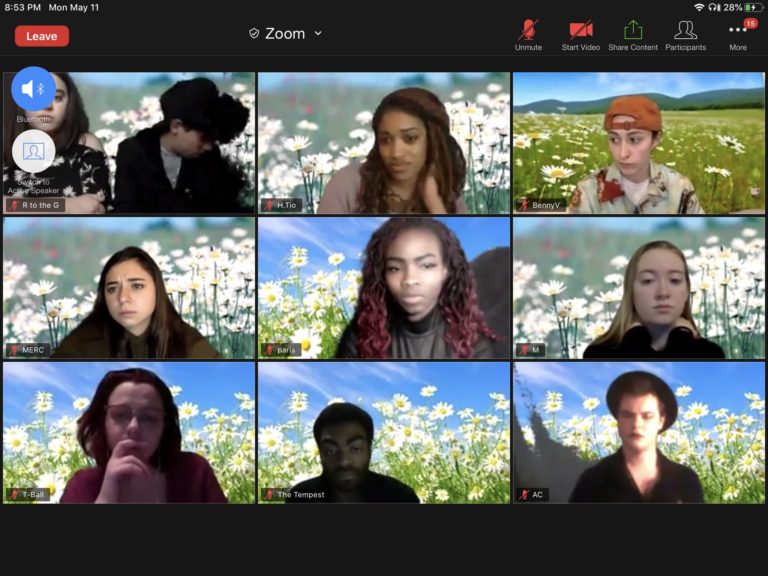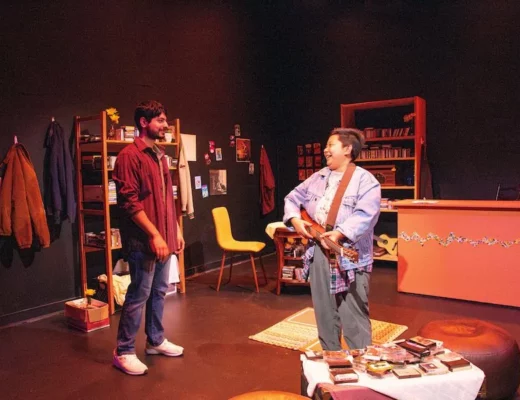By Daniella Ignacio
This article was first published May 15, 2020 in DC Theatre Scene here.
“O that this too solid flesh would melt, / Thaw, and resolve itself into a dew!” Hamlet cries out in his first soliloquy of the eponymous Shakespeare play. And as Shoshana Tarkow (she/her, resident director) and Megan Lohne (she/her, resident playwright) of Like Fresh Skin discovered, many young people in the midst of the COVID-19 pandemic find themselves feeling the same way.
Through Too Solid Flesh, written by Lohne and inspired by the young characters from three Shakespeare plays and Adelphi University theatre students’ stories, young artists were given the chance to process their feelings as their lives have been affected by the coronavirus and to explore a new form of immersive, technology-driven theatre.
The play incorporates live performance, pre- recorded videos, apps like Tik Tok, a video game, chat boxes and other games like Pictionary and presents it all over Zoom.
WHAT IT IS
When the COVID-19 quarantine hit New York, Lohne and Tarkow did a Zoom call together. Playing around with the platform, Tarkow said “Let’s push this platform to its limit in seeing what it can do, and let’s try to use it in ways no one else is using it and let’s create something that’s interactive and immersive and is narrative-driven and all of those things,” she said.
Lohne sent out a questionnaire for the Adelphi students. 18 students responded and are now part of Too Solid Flesh, with original characters written for them by Lohne, inspired by the experiences that they shared.
“The answers that came back to us were so genuine, truthful and honest, that we really just thought, this is a great springboard to create something,” Lohne said.
“You’ll see that it’s not the text, it’s not the Shakespeare, but it’s the ideas and the feelings of how big it is to not be able to graduate in real time, to not be able to finish out a semester, to be relocated to a family home where there’s all kinds of things happening there for you that make you almost feel not empowered anymore,” Lohne said. “It’s like you’re a kid again, right at this moment when you’re about to become an adult. And I think that’s very powerful. It’s so interesting when we see this with teens, with people who are age appropriate. I think they attach onto it very easily and it means something.”
The play, as it has evolved, concerns an anxiety-ridden student, O, who tries to find a connection while trying to do online distance learning, to “save her from her thoughts and herself,” as well as many other young characters inspired by those in Hamlet, Romeo and Juliet and The Tempest.
HOW THE SHOW WAS MADE
Too Solid Flesh uses various emerging technologies, from Zoom to next-generation apps. Among these technologies include specific sections that have been pre-recorded for different purposes; Tik Tok, used in both a presentational and interactive way; a video game in an observational capacity; Pictionary; chat boxes; and the Zoom live performances themselves.
They are constantly developing the piece, actively fixing it and changing it throughout the rehearsal process. For Tarkow, in both this virtual setting and in the previous theatre work Like Fresh Skin has done in the past, rehearsing a show that requires an active audience can be unpredictable.
“When you invite them to interact, you have to prepare for all of the ways that could go wrong, as well as all of the ways that could go right,” Tarkow said. “It’s sort of this teeter-totter between making sure that the narrative is there and the acting is solid…and all of that stuff you have in any normal production, and then simultaneously, structurally – it is working? – technically – are things falling apart? – there’s sort of two conversations after every rehearsal, in a debrief. And then we move forward.”
In order to ensure that all of the different modes of technology can be used efficiently for performances, four stage managers are on the project, including one designated stage manager as the media and content supervisor. All of the materials are on one Google Drive.
“It’s really been a team effort to accomplish that,” Tarkow said. “We are 100% blessed to have all of them on board for this.”
“A lot of it honestly came from the students, things they are interested in, things that are inspiring to them on social media,” Tarkow said. “It feels very timely and very contemporary to be using things that are their means of expressing themselves anyway.”
Beyond the performance, students are also taking to social media, using Tik Tok, Instagram and even one Tinder account to interact with each other and audiences as their character. They’ve also started doing Instagram Story takeovers to help share who their characters are and to help create buzz.
“I will say that as the director, in the room, I’ve noticed a sizable difference in how connected they are to their characters since they’ve started doing this,” Tarkow said.
CONTEXT FOR TODAY’S CLIMATE AND TECHNOLOGY
It’s been a learning process to explore new ways of playwriting and engagement with Zoom.
For example, the company has been attempting to re-create the experience of immersive theatre where oftentimes the audience gets subdivided into multiple spaces and has experiences in smaller, more intimate settings, and then gets brought back into a big physical space, where they have a group scene. To emulate that physical movement, Lohne and Tarkow tried using Zoom breakout rooms.
“Our experience thus far has been that there’s a lack of forward momentum that is caused by doing it in Zoom that doesn’t exist when people are walking in a physical space,” Tarkow said. “So in order to not halt the narrative, and have there be this waiting to see what’s next, we are going to be cutting back on our use of breakout rooms, and sort of re-evaluating.”
According to Tarkow, it is important that whenever you’re doing something, any kind of theatre, but specifically something that is groundbreaking or changing structures, to always sit back and say, “What is the value of doing this thing? What are we gaining?”
For Lohne, the process of playwriting over Zoom has allowed for quick and efficient troubleshooting and communication. While in Zoom rehearsals, Lohne can rewrite in real time, and she has been revising the play to account for technical elements and timing.
“We’re very collaborative, and I think that generates these very cool, exciting new forms of theatre that we’re really trying to push the bounds to what that can be for us and our company,” Lohne said.
A NEXT STEP PROCESS
This kind of innovation is vital in a world where many educational institutions have not yet made final decisions on whether students will be returning to the classroom in the fall, and pre-existing online universities that offered arts programs could benefit from more streamlined live performances. Like Fresh Skin hopes to make performances like this a “next step process.”
According to Lohne, some of the early responses from audiences who have come to rehearsals were that it really hit home, which is what the company wants to do with this piece. She hopes people will leave the play thinking about what’s next and allowing themselves to live in their emotions a little more.
“I do hope that it actively makes them consider, ‘What do I miss?’” Lohne said. “I can’t tell you one conversation I haven’t had with a friend, who brings up missing something, however small it might be. I miss walking down the street to get frozen yogurt. I miss meeting up with friends and sitting, like less than six feet apart, on a park bench. It’s very simple little things and I think if we can ignite that big universal truth, we’ve done our job.”
Tarkow agrees. She said that when they first sent out the questionnaire, she thought that she would receive reactions from students asking for something light and fun, an escape. It turned out that what they really wanted was to process what was going on and work through it in the best way they knew how: the performing arts. Tarkow said that it excites her to create a new kind of theatre, and she wants theatre makers to be excited, as well.
“I hear so much dismay and so much giving up on the arts right now, like ‘We will come back stronger than ever,’ but it doesn’t address what happens until we come back,” Tarkow said. “And I think there is the potential to create moving, affective, beautiful entertainment given the technology available to us now, and that I hope that we move beyond live streams and pre-records and staged readings. Not that there isn’t value in all of those things. But I hope we move into something that feels a bit closer to what you feel when you’re in a theater.”





No Comments